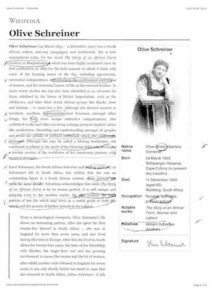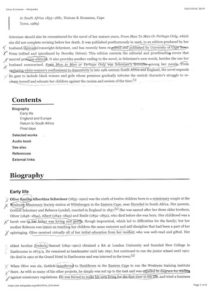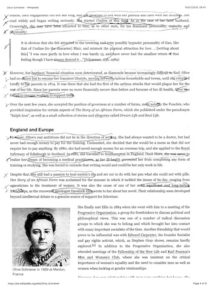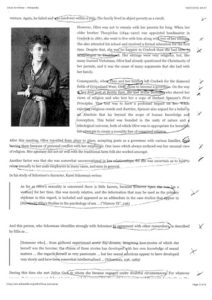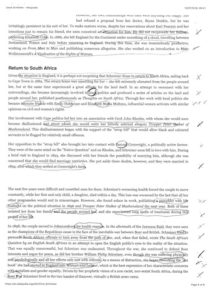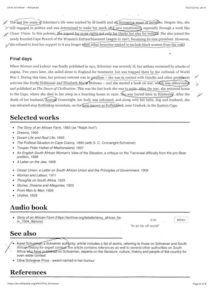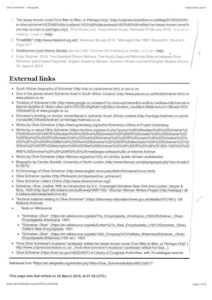Wikipedia on Olive Schreiner, like it or what?
Wikipedia has become an important aspect of how many people engage with the relationship between knowledge, facts and the Internet by offering a shortcut way – as a kind of revisable encyclopaedia – for people rapidly and with little effort to find information on things they know little/nothing about. This is knowledge pre-chewed, as it were, served up to people in a ‘here it is’ way, often without informing them about the ifs and buts, the disputes and debates, that exist or providing any immediately clear information about the knowledge and views of the people who produce its content. Yes, anyone can access the behind-the-scenes pages which show some aspects of the editing process – but in practice the vast majority of users do not do this. If they did then they would find that each article has a ‘talk’ page, where editors discuss the article and possible changes, and there is also a ‘View history’ page on every article showing the history of edits and who made them. But as noted, most readers of Wikipedia are unaware of these functions and don’t use them. And anyway, even if they did there are still major problems.
Do these ‘hidden’ editors know about the topics under consideration, do they have a good grasp of what the current state of knowledge about something is, and do they understand how to evaluate the quality of different positions, ideas and claims? The bottom line is, are these editors able to detect serious issues in what an entry represents as knowledge?
Whatever the answer to these questions in relation to particular entries, sometimes what results are good, even very good, entries; however, sometimes the results are dire. But in both instances they raise problems. In a nutshell, the premise of formalised education is that knowledge is gained in a step-by-step way and that its basis is in someone finding out about and actively engaging with a variety of sometimes disagreeing but at basis accredited sources; while the premise of Wikipedia is that the many – people with varying amounts of knowledge or lack of it – should contribute to the making of the entries. However, in defences of Wikipedia the strong impression is often given that notions of expertise and accreditation are limiting or even seen as straightforwardly to be rejected.
Both positions have something going for them in terms of raising serious issues. Also both have problems, but some of the problems are more limiting and annoying than others. An example concerns the current version of the Wikipedia entry on Olive Schreiner. For context here, I have spent a good part of my working life on the unpublished as well as published work by Olive Schreiner, including transcribing and publishing the totality of her 5000+ extant letters and also more recently in publishing variorum [exact] editions of her unpublished manuscripts [https://www.oliveschreiner.org]. Google Scholar searches will provide an indication of the range of my publications on this over the last 30 years or so. And I should add to this, that I am one among a growing number of people who are engaging seriously with primary sources in order to re-revision and reinterpret the work of Olive Schreiner. I refer to the publications of this group collectively as ‘Schreiner scholarship’ later in this discussion.
Reading the Schreiner Wikipedia entry recently [early morning on 10 July 2019] because I was asked to speak at an Edinburgh event concerned with wiki editing, I found many errors and also misleading interpretational statements, not to mention serious omissions of people, activities and views [see later on this blog for details]. However, the entry exists and the premise of Wikipedia is that making corrections to it would require providing ‘chapter and verse’ for all changes made, even though the entry itself does not provide chapter and verse for the things it erroneously proposes as facts about Schreiner, her life and her work. The Wikipedia entry is around 3000 words long and ‘correcting’ it would take about as much effort as writing an article or small book. However, those of us who constitute ‘Schreiner scholarship’ are involved in producing original work based on primary materials of different kinds. So is it sensible for those who are the most knowledgeable about Schreiner to drop tools and do the equivalent of minutely correcting student work to bring it up to a basic standard in order to repair deficiencies in the Wikipedia basic editing process?
And just to be quite clear about this: I am absolutely not objecting to many people with different kinds of knowledge-bases contributing and helping to re-configure what is seen to constitute knowledge. After all, as the principal investigator of the Olive Schreiner letters project and the editor of the Olive Schreiner Letters Online, I have put some years of my life and a good deal of grant income into producing a source which can be used by many people world-wide to carry out their own investigations in revisioning the South African past. And ditto with my work on Whites Writing Whiteness [https://www.whiteswritingwhiteness.ed.ac.uk]. But I do think that people making knowledge-claims in the public domain really should take responsibility for what they do and equip themselves by doing homework and making themselves aware and knowledgeable of what ‘the field’ is and its main ideas, work and debates.
At this point, rather than continuing the discussion around principles and general points, I want to turn attention to the Schreiner Wikipedia entry itself. Copies of its pages, as these were present on the early morning of Wednesday 10 July 2019, will be found below with pencil encircling and crosses in the margins indicating the main things I think problematic or wrong. Skimming through these will enable present readers to see the basis of my objections to what the Wikipedia process has produced in this particular instance.
These points are made in a list form, in hopes that some present readers might pick up various of these points and engage with the wiki entry in a way I won’t do because my time is already fully committed to producing new knowledge about Schreiner and her work. The points are stated baldly, but chapter and verse for everything can be found in the published works of collective ‘Schreiner scholarship’, my own included.
And a final point before providing the lists for each page of the Wikipedia entry in turn. Around 2000 words of this blog of 3400 words has been spent in just listing the problems. This illustrates that correction of the circa 3000 word wiki entry on Schreiner is not very sensible, and the entry needs starting again.
Page 1
- The Story of an African Farm was not written in Matjiesfontein
- It is not concerned with the professional aspirations of women
- There is little sign of much interest in vegetarianism; however, OS later came to admire Buddhism, and became interested in vegetarianism much later around the Great War period
- OS’s views do not escape categorisation as such
- Rather than avoiding political radicalism OS embraced it; and if this is a reference to her later position with regard to WSPU campaigns, she subsequently changed her mind because of the violence of male responses to these
- She did not develop a secular version of her parents’ views, she rejected them
- Karel Schoeman’s work is rather problematic because he disapproved of Olive Schreiner, which marks what he wrote and how he wrote, and also there are points where the factual basis of his argument is wrong because his strong views led him not to consult sources in some archive locations [see the last point regarding page 3 for an instance of this]
- Schreiner’s reputation was more outstanding in other parts of the world
- Schoeman’s book is not the most useful guide, and anyway no one source should be used like this
- Schreiner’s baptismal record says her second name was Emily
- She never had an occupation as such, and she is better described as a writer and social commentator
- William Schreiner is usually referred to as either WP or Will, and why mention just one out of the six other siblings of OS’s?
Page 2
- Cronwright-Schreiner was known as Cronwright or Cron and he did not use the Samuel
- The new edition of From Man to Man was not re-edited by the University of Cape Town Press, just published by it
- There was only one previous edition [by Cronwright-Schreiner] before Dorothy Driver’s; other publications of it make use of the first edition and it is just the editorial commentary that is new in these
- It was not her favourite among her novels, every last book OS wrote became her favourite
- Its central topic is not as here but the different forms that prostitution take
- As earlier, her baptismal record says the name was Emily
- Gottlob Schreiner transferred to the Wesleyan missionary society in 1846, and before then was employed by the LMS
- Gottlob was not loving and gentle, this is a mythology about him by people reading from a character in the African Farm; family letters in particular from Fred Schreiner indicate he was as strict a disciplinarian as his wife
- Olive Schreiner gained most of her education from books, and there were excellent libraries at that time
- The eldest Schreiner son was called Frederick with a K, but was generally known as Fred
- The move to Healdtown was more a promotion as it was one of the leading institutions for black education at that time
- Gottlob wasn’t exactly expelled in disgrace, for although he had infringed trading regulations so did many others; this was largely a pretext to get rid of him, as he seems to have been a stubborn disputatious person
- Gottlob had always made his own living; he was employed by first the LMS and then the Wesleyan missionary society
Page 3
- Insolvency is a legal term and Gottlob was never insolvent in that sense. The family were not wealthy, but they were not in ‘abject’ poverty as son Fred paid a regular allowance
- The two siblings OS went to live with were Theo and Ettie, and it is notable that none of her sisters [Katie, Alice, Ettie] are mentioned in the wiki entry, nor any of the other women she was close to except Betty Molteno
- She had not been unhappy in these places, although she deeply resented and was angered by her harsh treatment on religious grounds from Theo and Ettie
- It was Theo and Ettie who left for the diamond fields, Will only joined them at holiday periods
- Choosing to become a governess is not quite right, as there were few other choices for respectable white women in South Africa at that time who wanted to earn an income
- She did not meet Willie Bertram in Barkly, but when she was staying with a relative in Hermon and he arrived as a visitor to the family
- She was not as influenced by Spencer as the lengthy comment here implies; she was impressed by his ideas initially, but soon shook them off and later knew him only because of his opposition to the South African War
- She did not generally leave her governess posts because of personal conflicts
- She was not uncertain of how to ‘relate sexually’ to male employers in the way this says, it was not on the agenda apart from sexual harassment from one or more of them
- Schoeman is weird about Olive Schreiner and sexuality and it is supposition that the stuff in Ellis is about her
- Identifying this person as Schreiner is not in agreement with most good researchers, and anyway it is not ‘fact’ but Ellis’s version of something relayed to him
- The florid description of Schreiner as very passionate et cetera is part of Schoeman being generally odd about her
- OS did not become engaged to Julius Gau under doubtful circumstances; she took him to meet her parents when they first became engaged and it was all completely ordinary; he later broke their engagement because he married a wealthy widow; this is documented in one of the sources that KS did not consult
Page 4
- It is not so simple as she started on Undine at this time: she started all of what became her three main novels at the same time
- She was not generally attracted to men because of a ‘dominant personality’ etc
- Her brother Theo’s financial situation did not deteriorate, he found a fairly large diamond and then he and Ettie used the money from this to promote pro-black causes through a religious organisation which they became senior members of and with Ettie being its Cape leader
- OS did not have a transient lifestyle at this time, she had jobs and moved between them when verbal contracts ended
- She did not return to her parents to live In 1874 but visited them
- OS did not work to support her parents; she did not help support financially [along with Will and Fred] until after her father’s death
- Why the Fouches most notably?
- It is a misrepresentation to say OS’s inclination was towards doctoring and she did not have ambitions in the direction of writing; like all her siblings, she wanted to be a doctor for a relatively short space of time when quite young; her later thought about nursing was because working as a nurse would give her a wage
- She did not give up her nursing aspirations in Southampton; she worked as a trainee nurse at a hospital in Scotland for a short period
- The idea of a ‘passion to heal society’s ills’ derives from Berkman’s work [but which is not referenced], and anyway it is now clear because of much new research across ‘Schreiner scholarship’ that had Berkman over-generalised something specific
- While significant earlier, OS’s friendship with Ellis had largely ended by 1914
- Ellis did not start out as a sexologist, this was largely after OS had died
- By 1914 the relationship was actually experienced as highly problematic on both sides, but which they continued in a ‘for old time’s sake’ way while fundamentally disagreeing
Page 5
- In significant part Pearson did reciprocate an attraction; and he did not ‘prefer’ Elizabeth Cobb, he married her sister
- The chronology of when Schreiner wrote things is more complex than just saying in 1886 she was tremendously productive
- It was not the situation in England that led OS to return to South Africa, it was a specific plan around a writing project and was to have been for a specific fairly short period of time
- It was not local politics OS became involved with, which she tended to avoid; it was politics across South Africa and its then four states; and if ‘local’ refers to South Africa, then it really ought not to
- Emily Hobhouse was not an intimate friend; like most people, OS admired some aspects of her conduct but was put off by her imperiousness
- Molteno is usually referred to as Betty, and anyway OS had many more feminist friends than this, but who are notable for their absence even as a general category from the entirety of this wiki entry
- The novella Trooper Peter is not about Rhodes as such; it is about the massacres in Mashonaland, and touches on Rhodes as the force behind these events, although its main focus is all white people and their/our hypocrisy and in particular that of so-called Christians
- Cronwright was known universally as this or Cron
- They did not settle at his farm; he actually managed the farm, called Krantz Plaats, for someone else, and they stayed there after marriage to see whether her asthma could cope with it – it could not
- She did not publish it with her husband; she wrote it and it is published under her name; he read it out at a public meeting as she disliked public speaking
- She was not isolated from the people around her, she was very close to many people
- She did not experience long spells of loneliness at this period of her life in the 1890s, that was later when she was in Hanover and De Aar
- They did not move to Johannesburg for health reasons, but because he had secured a job there
- She did not try to persuade South African officials in the way this suggests
- She did not suffer physically and psychologically for defending her views
- She did not ‘rework’ at this point, the late 1890s. In fact she wrote from scratch two articles published in journals just as the war started in 1899, and it was then later in around 1910 that she reworked them
- The ‘Boer War’ in contemporary historiography is referred to as the South African War, for a politics is involved in the nomenclature
Page 6
- ‘The last few years’ are usually dated from around 1918 on, not around 1900, which is 20 years before she died
- The sense of isolation came when she was living in Hanover during the 1899-1902 war and then in De Aar, because of the kind of nationalist and narrow-minded people who lived there
- She wasn’t trying to make ‘a mark on the new constitution’ as such, Closer Union is an argument in favour of federal systems of governance which also points out the likely ramifications of the union of South African states being proposed
- It does not particularly argue for more rights for women
- She stopped supporting the WEL when its leadership decided they would support an extension of the vote to women ‘on the same terms as men’, and she objected to its exclusion of black men as much as black women
- Mentioning only Hobhouse and Molteno truncates her political involvements in a quite startling way.
- The book on war which she began was not abbreviated and published as the Dawn of civilisation essay, this was Cronwright-Schreiner picking out a piece to publish posthumously; however, the full remaining manuscripts were published in a book last year, but this is not referenced
- Schreiner was not buried in Kimberley
- The mis-use of Samuel to describe him already been mentioned, and the farm he managed was called Krantz Plaats, not as here
- There is a fuller list of Schreiner’s works on the Olive Schreiner Letters Online website, and this includes downloadable PDFs of all her books
- Schoeman is not the main Schreiner authority, his is just one voice and his work was produced outside of the collective framework of most ‘Schreiner scholarship’
Page 7
- The notes manage to miss almost all relevant references
- The external links are also problematic
Last updated: 18 July 2019

